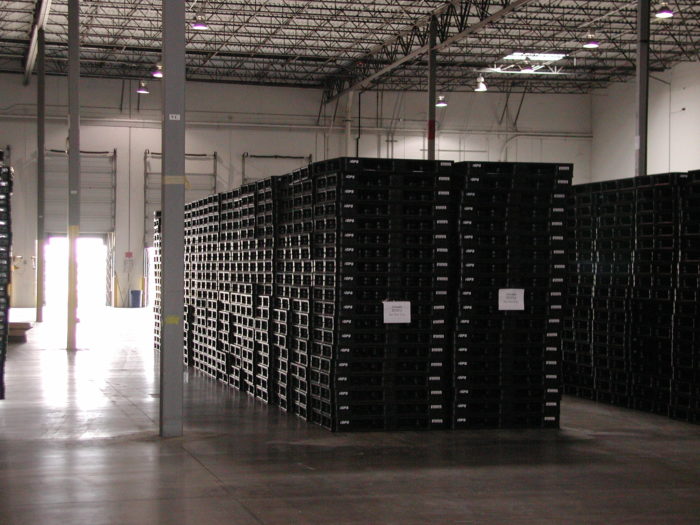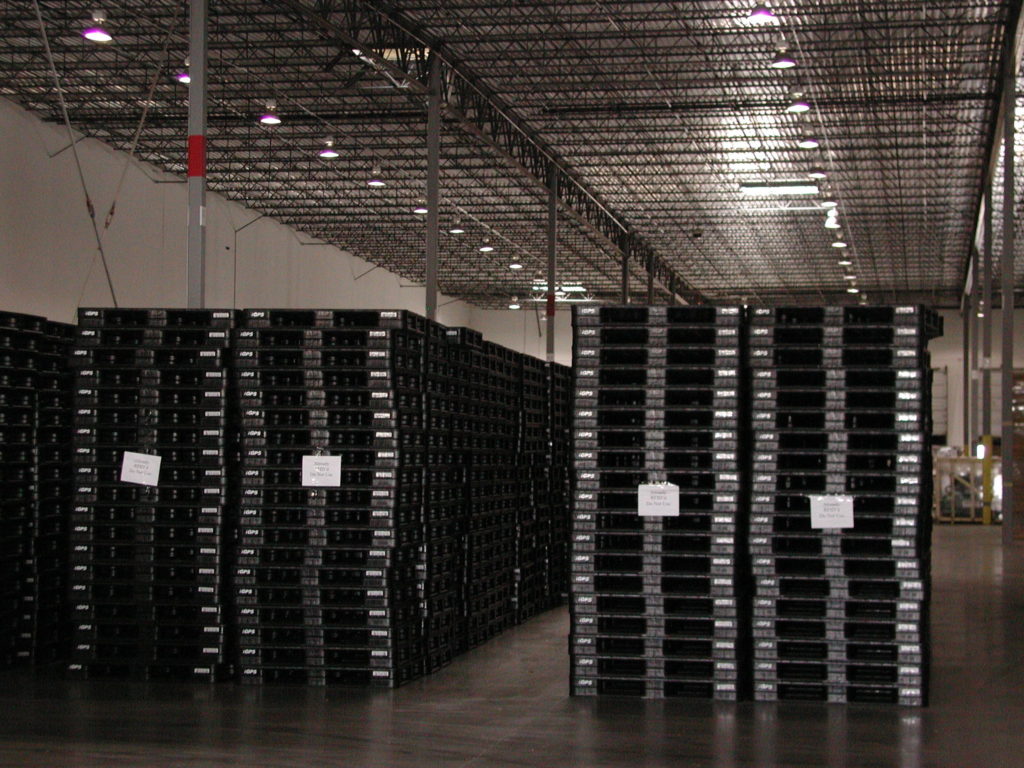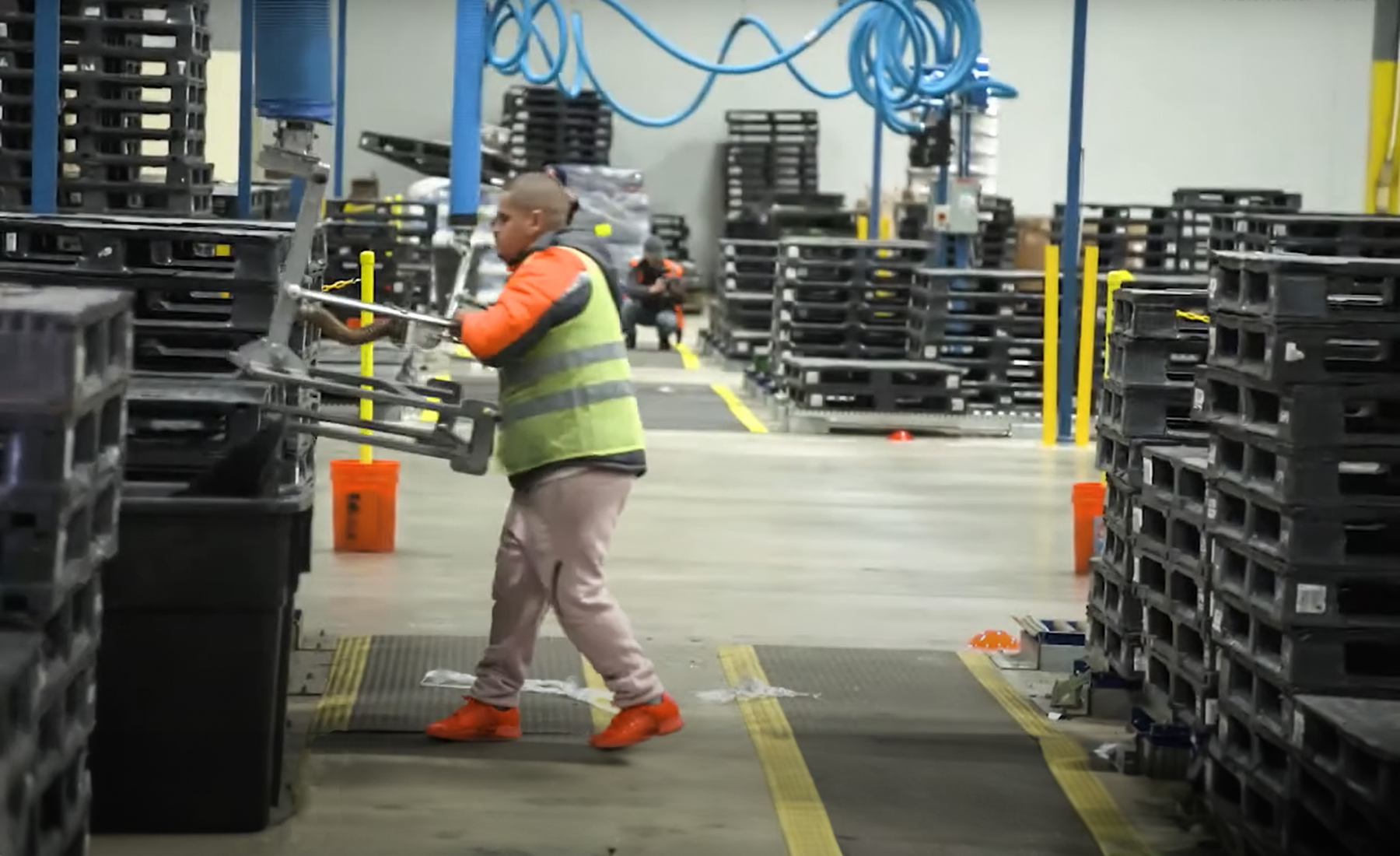If you’ve spent any amount of time around a grocery store or other packaged goods retailer, you know that abandoned pallets are a common sight. Orphaned pallets can often be found propped against the back walls of retail stores where drivers abandoned them after delivery. To dispose of the pallets, the retailer will generally end up paying to bring in a pallet logistics or recycling company. It’s an issue that arises at both commercial and residential properties, and it’s one that logistics coordinators know all too well. That’s because a great deal of their time is often spent trying to manage the flow of pallets and prevent them from piling up at delivery points. While pallets are vitally important to the supply chain, cost-effective pallet management can be an elusive goal. In this post, we’ll talk about some of the ways companies have tried to solve pallet management issues, and the best options for dealing with pallets responsibly and cost-effectively.
The One-Way Supply Chain
 The supply chain is a movement of materials and products that is much like a powerful river, and like a river, it flows in one direction—from producers to consumers. As the platform that gets products to the end of the supply chain, a pallet has a great deal of value when it is carrying a load to the retailer, but once it is unloaded, trying to ship it back to the producer is a lot like trying to move upstream against a current.
The supply chain is a movement of materials and products that is much like a powerful river, and like a river, it flows in one direction—from producers to consumers. As the platform that gets products to the end of the supply chain, a pallet has a great deal of value when it is carrying a load to the retailer, but once it is unloaded, trying to ship it back to the producer is a lot like trying to move upstream against a current.
Reusing pallets is a more cost-effective and sustainable pallet management strategy than disposing of them after one or two uses, but it comes with some inherent challenges.
The result is that empty, single-use stringer pallets frequently wind up in the dump, costing companies the price of the pallets, their transportation, and a disposal fee—all for a single use. At the production end of the supply chain, on the other hand, there is a constant demand for new pallets to replace those leaving the production center. This cycle creates a more or less continuous source of expense and waste, as trees have to be cut to replace the pallets that have been disposed of, a practice that certainly doesn’t contribute to green warehouse practices. Reusing pallets is a more cost-effective and sustainable pallet management strategy than disposing of them after one or two uses, but it comes with some inherent challenges.
Reusing Pallets to Reduce Cost and Waste
For a company with small loads and just a few fixed routes operating in a region that isn’t too large, reclaiming and reusing pallets is feasible. A machine or metalworking shop that delivers a fixed number of loads with their own transportation can simply ask for their pallets back after dropping them off. However, when the number of products shipped increases along with the number of destinations, pallet management becomes much more difficult. Reusing pallets on a multi-state or multinational scale requires, at a minimum:
- Dedicated Transportation: As the number of pallets in a supply chain grows, dedicated transportation is necessary to retrieve them. This results in either a dead leg, in which a vehicle is loaded only with empty pallets, or a complicated transportation scheme which involves mixed cargo of loaded and empty pallets.
- Storage Areas: Managing the number of pallets needed to operate a national or international supply chain requires a surplus of pallets in order to guarantee that enough of acceptable quality will always be on-hand, in the right place at the right time, and usable. A company managing its own pallets will either have to make room at its existing facilities or create new facilities dedicated to pallet management, which complicates transportation further.
- Pallet Sorting: Pallets inevitably become damaged when they are used, and at some point, pallets that have made their way through the supply chain will need to be inspected to determine if they are fit for reuse and, if not, whether they can be restored to reusable condition. Pallet sorting is a labor-intensive task that requires significant staffing and space.
- Pallet Repair: Pallets that are damaged but can be made fit for use again should be repaired to maximize their value. Usually this takes place at a dedicated facility with purpose-built equipment and staff trained in carpentry.
Effective pallet management means essentially running a parallel pallet business operating alongside a company’s core business and competing for management’s attention, transportation, and other resources. It’s a distraction that few companies find worth the effort. Instead, many turn their pallets over—effectively donating them—to a local pallet yard that repairs and resells them. Neither method—in-house pallet reuse or disposing of pallets after one use—is economically or environmentally efficient. Instead, most companies find that the most cost-effective pallet management strategy is to turn their pallet management over to a pallet pooling provider.
Pallet Pooling Offers Cost-Effective Pallet Management
A pallet pooling provider is simply a company that maintains a supply of pallets and rents them to other companies as needed. The pooling service delivers a supply of pallets that meet the specifications requested by its customers and arranges for those pallets to be recovered, sorted, repaired, and, most importantly of all, reused. Having a system in place for recovery and reuse prevents pallets from piling up around a company’s loading dock and does away with the unnecessary waste involved in constantly ordering new pallets and disposing of old ones.
Washing absorbent wood can cause mold and mildew issues and can increase the weight and even the dimensions of a wood pallet.
However, not all pallet pools—or pallets—are created equal. The majority of pallet pools rely on wood block pallets. These are sturdier than single-use stringer pallets, but reusing wood pallets can create hygiene issues in sensitive supply chains, complicating pharmaceutical and fresh food logistics. Sanitizing a wood pallet isn’t easy; while they are usually heat-treated to kill microbes before being used in the supply chain, they are generally not cleaned at all once they’ve been put into service. Washing absorbent wood can cause mold and mildew issues and can increase the weight and even the dimensions of a wood pallet. This, in turn, can cause product damage during transportation and, ultimately, rejected loads.
 Despite these many issues, most pallet pools are heavily invested in wood and have been slow to address its shortcomings. Fortunately, an alternative is becoming more readily available. Durable, lightweight, easily sanitized plastic pallets are now available from some pallet pooling providers.
Despite these many issues, most pallet pools are heavily invested in wood and have been slow to address its shortcomings. Fortunately, an alternative is becoming more readily available. Durable, lightweight, easily sanitized plastic pallets are now available from some pallet pooling providers.
If you choose to switch to pooled plastic pallets, find a pallet pooling company that specializes in plastic pallets. A provider dedicated to plastic pallets will have better customer service and will be able to provide your company with the number of plastic pallets you need at the time and place you need them.
The iGPS pallet pool offers durable, hygienic plastic pallets that combine the advantages of pallet pooling with the benefits of a superior shipping platform. To switch to a shipping platform that can help lower your Total Cost of Business, give our team a call at 1-800-884-0225, email a specialist at switch@igps.net, or visit our contact page.
Image 2: Unsplash User Norbert Kundrak



